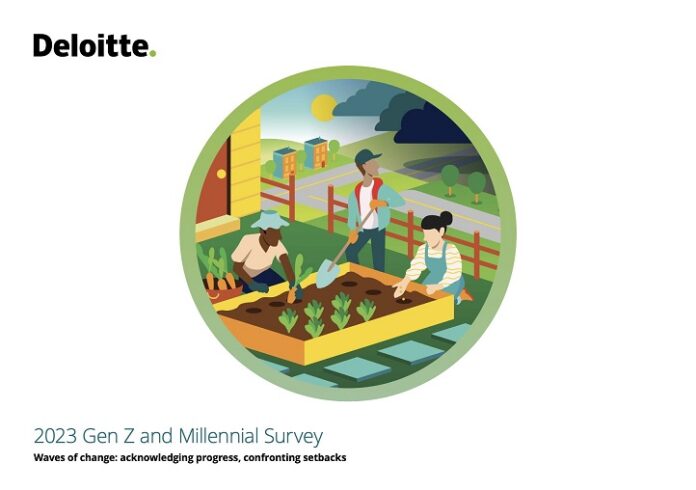Deloitte Thailand reveals the results of the Global 2023 Gen Z and Millennial Survey, which also reflects on country-specific perspectives of Gen Z and millennials, including Thailand, towards the economy, society, and environment, compared to the global average across the same generation.
Now in its 12th consecutive year, the survey gathered insights from more than 22,000 Gen Z and millennial respondents across 44 countries. The objective is to track the changing mindsets and perspectives of Gen Zs and millennials, the dominant workforce in the global labour market. For this survey, Gen Z and millennials refer to those aged between 19-28 and 29-40, respectively. In Thailand, Deloitte surveyed 200 Gen Z and 100 millennials, revealing in-depth perspectives on their financial situations, society, and the environment.
Economy
Results show that, on average, more Thai Gen Zs and millennials are satisfied with their work/life balance and organisation’s DEI (diversity, equity, and inclusion) efforts compared to the global average. 51% and 41% of Thai Gen Zs and millennials, respectively, are satisfied with their job’s current work/life balance, compared to 34% and 31% globally. 45% and 24% of Thai Gen Zs and millennials responded to being very satisfied with their organisation’s DEI efforts compared to the global average of 33% and 28%.
The top 3 most significant concerns for Thai Gen Zs and millennials are 1) cost of living, 2) unemployment, and 3) income inequality/ distribution of wealth. 67% of Thai Gen Zs and 62% of millennials indicated that they live paycheck to paycheck and worry that they won’t be able to cover expenses, compared to 51% and 52% globally.
As a result of these concerns, 66% and 71% of Thai Gen Z and millennials, respectively, have taken on extra jobs to create a secondary source of income. Top side jobs held by Gen Zs in Thailand included flexible ‘gig’ work, such as through food delivery or ride-sharing apps, followed by social media influencers and content creators. For millennials, the top side job was selling products and services through online platforms.
Despite facing financial pressures, 86% and 65% of Thai Gen Zs and millennials, respectively, would consider looking for a new job if their employer asked them to go on-site full-time. Almost 70% of both Thai Gen Zs and millennials surveyed said it would still be possible to ask for more flexibility at work to help foster better work/life balance in the following areas: 1) creating more job-sharing options, 2) ensuring part-time employees have comparable career advancement and 3) implementing condensed four-day work weeks.
Struggling to disconnect and create boundaries from work is a significant concern for Thai Gen Zs and millennials. Survey results reveal that 40% of millennials respond to work emails/messages outside of regular working hours daily, whereas 32% of Gen Zs typically face these 3-4 days per week. As a result, both generations feel stressed, with 72% of Thai Gen Zs and 63% of millennials feeling burnt out from demanding workloads. Other contributors to anxiety and stress include 1) long-term financial future concerns, 2) day-to-day finances, and 3) family health and welfare. This results in over 90% of Thai respondents placing importance on mental health support and policies when considering a potential employer, compared to the global average of around 80%.
Society
Over the past three years (2021-2023), there has been a downward trend in the satisfaction levels of both Thai Gen Zs and millennials with their organisation’s societal impact. They feel that politicians, social justice and sustainability advocates, and TV news personalities are the top groups to have an essential or leading role in highlighting social issues in Thailand. Those with a less important role are entertainers, religious leaders, and sports stars.
82% of Thai Gen Z and 85% of millennial respondents believe they have the power to drive change in their organisations, greater than the global average of 58% and 55%. 75% of Thai Gen Zs and 52% of millennials have rejected an assignment, and 63% of Thai Gen Zs and 52% of millennials have rejected a potential employer based on their personal beliefs or ethics, which is higher than other countries in Southeast Asia.
For both generations, the top 3 factors selected as the most important to their sense of identity are 1) work (their primary job), 2) friends and family, and 3) secondary jobs. The top 3 factors selected as the things that impress them the most about peers are 1) their ability to live life on their terms, 2) their ability to maintain a positive work/life balance, and 3) their ambition to continue learning new skills.
Environment
When asked about their perception of climate change over the past month, 78% of Thai Gen Zs and 81% of millennials have felt worried or anxious. 80% and 83% of Thai Gen Zs and millennials are willing to pay more to purchase environmentally sustainable products or services, compared to around 60% of global respondents across both questions. Amongst both generations in Thailand, about 30% agree that large companies are taking action to protect the environment, compared to around 18% of global respondents.
The new generation believes that the top action they can take now to reduce their environmental impact is to avoid buying fast fashion products. The activities they intend to do in the future include 1) making their homes more energy efficient and 2) eating a vegetarian or vegan diet.
Both Thai Gen Zs and millennials feel their organisations should invest more resources to help combat climate change in the following areas 1) greening local communities and communities where they work, 2) educating/ training their employees about how to be more sustainable, and 3) providing employee subsidies for sustainable choices.

Ariya Phukfon, Executive Director, Deloitte Consulting, explained that “the survey results revealed that the new generation of Thais have significantly different dimensions of thinking than those of neighboring countries or even the global average. Both generations of Thais have differing opinions surrounding many issues, especially once we break them down further. The management and development of human resources is becoming an increasingly intricate subject.”
Dr. Chodok Panyavaranant, Manager, Clients & Markers, Deloitte Thailand, added that “comparing data across countries and over the years from locally and globally reveals changes in the overall picture and various trends that will lead to more efficient human resource planning.”
Ariya Phukfon concluded that “Deloitte has conducted the Gen Z and Millennial Survey for 12 consecutive years, and will continue to do so, to follow trends and changes amongst this group. It’s important to remember that there is no ‘one size fits all’ solution. We must also consider the organization’s specific context and nature in our pursuit.”
To learn more about the Deloitte Global 2023 Gen Z and Millennial Survey and the Mental Health Deep Dive based on the findings visit: https://www.deloitte.com/global/en/issues/work/content/genzmillennialsurvey.html.

Methodology
The Deloitte Global 2023 Gen Z and Millennial Survey reflects the responses of 14,483 Generation Zs and 8,373 millennials (22,856 respondents in total), from 44 countries across North America, Latin America, Western Europe, Eastern Europe, the Middle East, Africa, and Asia Pacific. The survey was conducted using an online, self-complete-style interview. Fieldwork was completed between 29 November 2022 and 25 December 2022. In addition to the survey, in March 2023, qualitative interviews were conducted with 60 Gen Zs and millennials from Brazil, Germany, India, Japan, the UK, and US. In Thailand, 200 Generation Zs and 100 millennials are part of the respondents of the survey.
As defined in the study, Gen Z respondents were born between January 1995 and December 2004 and millennial respondents were born between January 1983 and December 1994.

